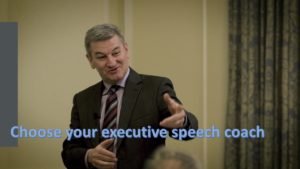How to choose your executive public speaking coach
Are you looking for an executive public speaking coach?
What questions might you ask? What traits might you look for? How will you know if you picked the right coach?
When you are looking for an executive public speaking coach, how do you evaluate your choices? How can you choose the coach that is right for you? Like communication, it’s an imperfect process. Yet, there are principles that you can follow to help you make a better choice.
Like many soft skills there are no hard and fast measures. Instead, it’s subjective which means it can be a difficult decision. For example, if price was your only criteria, the decision would be easy. Pick the cheapest.
Naturally the cheapest solution is to do-it-. yourself. Watch YouTube videos. I’ve found YouTube videos to be helpful when searching for a cooking recipe or how to repair a house electrical or plumbing problem. I’m a handy man so I can follow some of those videos for simple home repairs.
If you are looking for something more than free YouTube videos, consider these criteria when searching for your executive speaking coach.
When you are looking for help with your presentation skills, a speech or boosting leadership communication skills, you might want something more attuned to your specific needs and expectations.
What qualities should you look for in your speaking or presentation coach?
Your situation
The best coach is interested in your situation, your challenges and expectations. You’re looking for coaching not an off the shelf 12-step program. A good coach won’t waste your time with unnecessary and irrelevant instructions.
A good coach will insist on asking you probing questions about your situation. The best speech coach will ask you questions that you might not have considered yet or might find uncomfortable because that’s how you grow.
What is your desired outcome? What are your specific challenges? Where do you need the most help?
Tell me more about that.
Equal status
A good coach treats you as a respected equal, not as a child nor as a parent. We are equal in this relationship and we bring different and complimentary strengths to the conversation. I’m not here to scold you for being bad. I’m here to help you become a more effective speaker.
An executive speech coach has experience and comfort working with executives as equals. You deserve respect along with honest critical feedback.
A good coach will treat you with respect and tell you the truth. Imagine that.
Rapport
Rapport is probably a combination of connection and trust. Do you feel comfortable while revealing your concerns and challenges to me. Do you trust that I will keep our conversations confidential? Our coaching relationship is built on trust and openness – both ways.
Before we meet you can watch my videos and listen to my podcast interviews. They will give you a glimpse of style and substance. Naturally, the most significant measure of rapport is our initial conversation to get acquainted and clarify needs and expectations.
Do you like, trust and respect this person? Do the personalities connect or clash? Can we talk? Do we feel comfortable talking with each other?
Those are questions you need to consider.
Experience
You expect your coach to have experience. What does that mean?
There are three parts to the experience of an effective coach. The most important element is success. What success have they had with their clients? Look for powerful testimonials or offers to connect you directly with their clients for private conversations.
The second element to experience is, “Who have they worked with? What industries and what challenges?” The variety of industries and challenges is more relevant that a single situation because that demonstrates critical thinking. You don’t want the same answer that everyone else in your industry is hearing. You want to be different and better.
The more varied the experience, the better perspective for you.
The third element to experience is years of experience and commitment to ongoing learning. Normally ten years of experience is better than five and 20 years is better than 15 years.
What’s more important than time is what they’ve done to upgrade, study the craft and improve their own experience over that time frame. When was the last time they tried something new? How have they challenged themself lately?
Authority
Is your coach considered an authority? How do you know? What have they published? Articles, books, videos, podcasts? Where have they been quoted? Social media, mainstream media?
How have they challenged the status quo? What controversy have they purposely triggered to stimulate conversation? Are they hiding behind tired and accepted norms or are they disrupting common myths?
Do you want a coach who repeats what everyone else is saying or do you want a coach that will help you stand out from the crowd?
Are you ready to have a serious discussion with your executive speaking coach? More importantly, let’s talk about how you will boost your presentation results because it’s not about your coach. It’s about you and your results.
The next step is a phone or Zoom call about your presentation needs.
Go ahead, check me out. Read some of the posts on this blog. Watch some videos on my YouTube and listen to some of the interviews on my podcast, Your Intended Message.
I’m George Torok and I look forward to our first conversation.
Reach out to me:
Call 905-335-1997
DM me on Linkedin and I’ll send you my calendar link.

